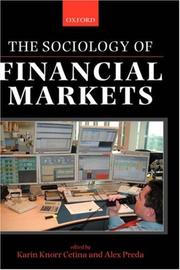| Listing 1 - 8 of 8 |
Sort by
|

ISBN: 0521837707 1107139864 9786610421992 0511170580 051108045X 051129770X 0511499418 1280421991 0511206488 0511079699 Year: 2004 Publisher: New York : Cambridge University Press,
Abstract | Keywords | Export | Availability | Bookmark
 Loading...
Loading...Choose an application
- Reference Manager
- EndNote
- RefWorks (Direct export to RefWorks)
This 2005 book examines the formation of scientific knowledge about the AIDS epidemic in the 1980s and shows the broader cultural assumptions which grounded this knowledge. Alex Preda highlights the metaphors, narratives, and classifications which framed scientific hypotheses about the nature of the infectious agent and its transmission ways and compares these arguments with those used in the scientific knowledge about SARS. Through detailed rhetorical analysis of biomedical publications, the author shows how knowledge about epidemics is shaped by cultural narratives and categories of social thought. Preda situates his analysis in the broader frame of the world risk society, where scientific knowledge is called upon to support and shape public policies about prevention and health maintenance, among others. But can these policies avoid the influence of cultural narratives and of social classifications? The book shows how culture matters for prevention and health policies, as well as with respect to how scientific research is organized and funded.
#SBIB:316.334.3M20 --- #SBIB:053.AANKOOP --- Sociale epidemiologie en etiologie: sociale aspecten van ziekte en gezondheid --- AIDS (Disease) --- Medicine --- Rhetoric. --- Social medicine. --- Social aspects. --- Language. --- Rhetoric --- Social medicine --- Medical care --- Medical sociology --- Medicine, Social --- Public health --- Public welfare --- Sociology --- Medical ethics --- Medical sociologists --- Language and languages --- Speaking --- Authorship --- Expression --- Literary style --- Acquired immune deficiency syndrome --- Acquired immunodeficiency syndrome --- Acquired immunological deficiency syndrome --- HIV infections --- Immunological deficiency syndromes --- Virus-induced immunosuppression --- Social aspects --- Language --- Health Workforce --- Social Sciences
Book
ISBN: 9786612239939 1282239937 0226679330 9780226679334 9780226679310 9780226679327 0226679314 0226679322 Year: 2009 Publisher: Chicago ; London : University of Chicago Press,
Abstract | Keywords | Export | Availability | Bookmark
 Loading...
Loading...Choose an application
- Reference Manager
- EndNote
- RefWorks (Direct export to RefWorks)
As the banking crisis and its effects on the world economy have made plain, the stock market is of colossal importance to our livelihoods. In Framing Finance, Alex Preda looks at the history of the market to figure out how we arrived at a point where investing is not only commonplace, but critical, as market fluctuations threaten our plans to send our children to college or retire comfortably. As Preda discovers through extensive research, the public was once much more skeptical. For investing to become accepted, a deep-seated prejudice against speculation had to be overcome, and Preda reveals that over the course of the eighteenth and nineteenth centuries groups associated with stock exchanges in New York, London, and Paris managed to redefine finance as a scientific pursuit grounded in observational technology. But Preda also notes that as the financial data in which they trafficked became ever more difficult to understand, charismatic speculators emerged whose manipulations of the market undermined the benefits of widespread investment. And so, Framing Finance ends with an eye on the future, proposing a system of public financial education to counter the irrational elements that still animate the appeal of finance.
Finance --- Stock exchanges --- Capitalism --- Bulls and bears --- Commercial corners --- Corners, Commercial --- Equity markets --- Exchanges, Securities --- Exchanges, Stock --- Securities exchanges --- Stock-exchange --- Stock markets --- Capital market --- Efficient market theory --- Speculation --- Funding --- Funds --- Economics --- Currency question --- Social aspects. --- Social aspects --- E-books --- 15 --- 333.645 --- AA / International- internationaal --- Psychologie --- Speculatie op de beurs --- finance, finances, markets, capitalism, capital, sociology, sociological, sociologists, banking, banks, economy, economics, stock market, history, historical context, investment, investing, speculation, new york, london, paris, internationalism, international trade, observational technology, education, social aspects, boundaries.
Book
ISBN: 0231554575 9780231554572 Year: 2023 Publisher: New York : Columbia University Press,
Abstract | Keywords | Export | Availability | Bookmark
 Loading...
Loading...Choose an application
- Reference Manager
- EndNote
- RefWorks (Direct export to RefWorks)
Alex Preda provides an ethnographic exploration of how financial expertise is performed and produced in the media, analyzing its features and how audiences react to it. He examines how analysts, anchors, and producers collaborate in manufacturing financial talk that circulates around the world.
Finance, Personal. --- Financial planners. --- Investment advisors. --- Fund managers (Investment advisors) --- Investment advisers --- Investment counselors --- Investment houses (Investment advisors) --- Investment management firms --- Money managers (Investment advisors) --- Consultants --- Financial planners --- Accredited personal financial specialists --- Planners --- Investment advisors --- Finance, Personal --- Financial management, Personal --- Financial planning, Personal --- Personal finance --- Personal financial management --- Personal financial planning --- Finance --- Financial literacy --- Planning --- Hong Kong. --- Irving Goffman. --- Society for the Advancement of Socio-Economics. --- TV and radio. --- business. --- ethnography. --- financial expertise. --- financial markets. --- financial talk. --- international finance. --- market interpretation. --- media studies. --- public-expert talk. --- social media influence. --- sociology of finance.

ISBN: 1280905794 9786610905799 0191557005 1423786807 9781423786801 9781280905797 9780199275595 0199275599 0199275599 6610905797 9780191557002 1383041857 Year: 2005 Publisher: Oxford New York Oxford University Press
Abstract | Keywords | Export | Availability | Bookmark
 Loading...
Loading...Choose an application
- Reference Manager
- EndNote
- RefWorks (Direct export to RefWorks)
Approaches financial markets from a sociological perspective. This book seeks to provide a sociological coneptualization of financial markets, and examines who the actors within them are, how they operate, within which networks, and how these networks are structured. This work is useful for those in the field of financial markets.
Economics --- Economic sociology --- Socio-economics --- Socioeconomics --- Sociology of economics --- Sociology --- Sociological aspects. --- Social aspects --- Sociological aspects --- E-books --- Financial institutions --- Finance
Book
ISBN: 9780191750502 9780198708773 9780199590162 Year: 2012 Publisher: Oxford Oxford University Press
Abstract | Keywords | Export | Availability | Bookmark
 Loading...
Loading...Choose an application
- Reference Manager
- EndNote
- RefWorks (Direct export to RefWorks)
Recent years have seen a surge of interest in the workings of financial institutions and financial markets beyond the discipline of economics, which has been accelerated by the financial crisis of the early twenty-first century. This publication brings together twenty-nine articles, written by scholars of international repute from Europe, North America, and Asia, to provide comprehensive coverage on a variety of topics related to the role of finance in a globalized world, and its historical development. Topics include global institutions of modern finance, types of actors involved in financial transactions and supporting technologies, mortgage markets, rating agencies, and the role of financial economics. Particular attention is given to financial crises, which are discussed in a special section, as well as to alternative forms of finance, including Islamic finance and the rise of China.
Economic sociology --- Finance --- Business cycles --- Economics --- Financial institutions --- Sociological aspects
Book
ISBN: 0191641359 0191750506 0191641340 Year: 2012 Publisher: Oxford, England : Oxford University Press,
Abstract | Keywords | Export | Availability | Bookmark
 Loading...
Loading...Choose an application
- Reference Manager
- EndNote
- RefWorks (Direct export to RefWorks)
This handbook brings together leading international scholars to provide a comprehensive overview of research and theory on the sociology of finance and the workings of financial institutions and financial markets.
Economics --- Sociological aspects. --- Financial institutions --- Finance.
Book
ISBN: 9780199590162 Year: 2012 Publisher: Oxford Oxford university
Abstract | Keywords | Export | Availability | Bookmark
 Loading...
Loading...Choose an application
- Reference Manager
- EndNote
- RefWorks (Direct export to RefWorks)
Economic sociology --- Finance --- Business cycles --- Economics --- Financial institutions --- 333.600 --- AA / International- internationaal --- Financial intermediaries --- Lending institutions --- Associations, institutions, etc. --- Funding --- Funds --- Currency question --- Socio-economics --- Socioeconomics --- Sociology of economics --- Sociology --- Sociological aspects --- Financiële markten. Kapitaalmarkten (algemeenheden) --- Social aspects
Article
Abstract | Keywords | Export | Availability | Bookmark
 Loading...
Loading...Choose an application
- Reference Manager
- EndNote
- RefWorks (Direct export to RefWorks)
| Listing 1 - 8 of 8 |
Sort by
|

 Search
Search Feedback
Feedback About UniCat
About UniCat  Help
Help News
News